|
Books Should Be Free Loyal Books Free Public Domain Audiobooks & eBook Downloads |
|
|
Books Should Be Free Loyal Books Free Public Domain Audiobooks & eBook Downloads |
|
Top Authors |
|---|
|
Book type:
Sort by:
|
By: Thomas Hardy (1840-1928) | |
|---|---|
 Changed Man And Other Tales
Changed Man And Other Tales
Eleven short stories. | |
 Wessex Poems
Wessex Poems
A collection of poetry by Thomas Hardy, some of which were previously published or adapted into his prose works. | |
 The Dynasts
The Dynasts
| |
 Late Lyrics and Earlier
Late Lyrics and Earlier
| |
 Group of Noble Dames
Group of Noble Dames
The pedigrees of our county families, arranged in diagrams on the pages of county histories, mostly appear at first sight to be as barren of any touch of nature as a table of logarithms. But given a clue—the faintest tradition of what went on behind the scenes, and this dryness as of dust may be transformed into a palpitating drama. Out of such pedigrees and supplementary material most of the following stories have arisen and taken shape. | |
 Romantic Adventures of a Milkmaid
Romantic Adventures of a Milkmaid
A milkmaid, Margery, encounters a mysterious foreigner and perhaps prevents him from committing suicide. In gratitude, the man offers her any reward she can name. She tells him she wants to go to a ball. He takes her, admittedly a bit reluctantly, to a yeoman's ball in a neighboring county. From there the story continues because of course, a lot happens after the ball. She happens to already have an engagement to a local lad but his hold over her seems to grow of its own accord. This Hardy story may not end the way you wish, but that is often true of stories by this master writer. | |
 A Laodicean: a Story of To-day
A Laodicean: a Story of To-day
| |
 Time's Laughingstocks
Time's Laughingstocks
| |
By: H. G. Wells (1866-1946) | |
|---|---|
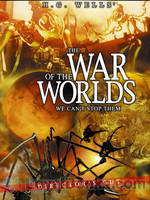 The War of the Worlds
The War of the Worlds
Extraterrestrial invasion, the earth taken over by omniscient intelligences from Mars, the whole of humanity under siege and a nameless narrator who seems to be the lone survivor of the complete devastation of human civilization – scenes from a Hollywood sci-fi blockbuster? Far from it! The War of the Worlds by HG Wells was written more than a century ago and went on to become an iconic work in the science fiction genre, spawning a whole new genre of literature featuring alien invaders. It was in fact the first book to present the idea of conflict between inhabitants of different planets... | |
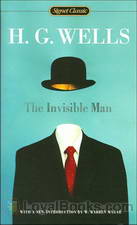 The Invisible Man
The Invisible Man
One dark and stormy night, a stranger arrives in West Sussex at a village inn. He is heavily clad in an overcoat and his face is wrapped in bandages. He takes a room at the inn, but refuses to socialize with anyone. He stays cooped up in his room all day and night, working with strange chemicals and apparatus. Suddenly, strange events begin to happen in the village. Mysterious burglaries and fires break out, culminating in a destructive rampage across the peaceful countryside. The stranger is the keeper of a terrible secret... | |
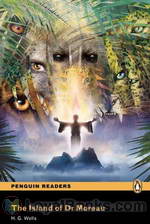 The Island of Dr. Moreau
The Island of Dr. Moreau
One of the first instances of science fiction, Wells’ classic tale published in 1986 examines various controversial philosophical issues active at the time of its publication, most notable being the implications of vivisection and degeneration. Narrated by its everyman protagonist Edward Prendick, the novel follows the events of his stay at a mysterious island, home to ghastly secrets, horrors, and incomprehensible experiences. Furthermore, the novel features innovative themes which have become iconic in the modern science fiction genre, including moral and ethical responsibility, evolution, and man’s interference with the course of nature... | |
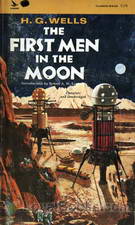 The First Men in the Moon
The First Men in the Moon
Written nearly seven decades before Neil Armstrong's historic “Giant leap for Mankind” this book by one of the most influential sci-fi writers in English is an interesting read. The First Men in the Moon by Herbert George Wells, the English author who is today called the Father of Science Fiction, describes a strange and fantastic voyage. Businessman and budding playwright, John Bedford takes a sabbatical from his work and decides to write a play. He moves to a lonely cottage in Kent where he hopes to come up with a theatrical masterpiece... | |
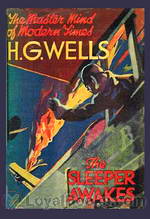 The Sleeper Awakes
The Sleeper Awakes
Originally serialized from 1898 to 1903, Wells later made some crucial changes to the piece to create a flawless dystopian science fiction novel published in 1910 and renamed The Sleeper Awakes. The novel focuses on an Englishman, who falls in a deep sleep lasting two centuries, and sees him wake up in an unrecognizable setting and extremely wealthy. An enthralling tale of dystopian society depicted through a colorful imagination, The Sleeper Awakes concentrates on topics including dystopia, political power, religion, plutocracy, and individual and social awakening... | |
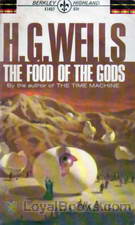 The Food of the Gods and How it Came to Earth
The Food of the Gods and How it Came to Earth
Two stuffy English scientists, always looking to further their scientific knowledge, create a substance called Herakleophorbia, which in its fourth incarnation – known as Herakleophorbia IV – has the special ability of making things increase greatly in size. As the scientists begin experimentation on some chicks, the substance is misused by some “country folk” who don’t take it seriously and soon Herakleophorbia IV is running rampant throughout England and then across the globe, creating giant plants and animals that wreak havoc on the land and then the people... | |
 Ann Veronica
Ann Veronica
Ann Veronica was a controversial book detailing the development of a naive school girl into a “New Woman”. When it was published, the Spectator described it as a “poisonous book … capable of poisoning the minds of those who read it.” Although it is unlikely to offend modern listeners in this way, this novel addresses many feminist issues that are still relevant today. | |
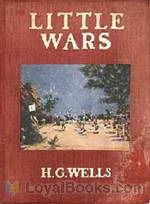 Little Wars (A Game for Boys)
Little Wars (A Game for Boys)
Miniature wargaming got its start with the publication in 1913 of this thoroughly entertaining little account of how H.G. Wells, with certain of his friends, took their childhood toys and turned play into acceptable middle-aged sport by subjecting the exercise to the civilizing influence of actual rules. While wargaming progressed far past these beginnings, Wells observes how “little wars” with even his elementary rules can suggest the wholesale crudity of the real thing. “You have only to play at Little Wars three or four times to realise just what a blundering thing Great War must be... | |
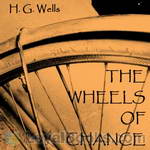 The Wheels of Chance
The Wheels of Chance
“The Wheels of Chance – A Bicycling Idyll” follows the adventures of a Drapers Assistant who, having brought an ancient bicycle, sets off on a 2 week tour of the countryside. He encounters a Lady in Grey wearing rationals (bloomers). And his world will never be the same again | |
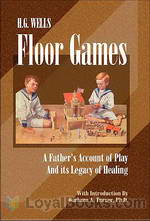 Floor Games
Floor Games
H.G. Wells had so much fun playing with his children on the floor of their playroom, he decided to write a jovial little book to inspire other parents in their pursuit of quality time with the kids. While the raw materials available from hobby stores of his day were woefully short of the variety and quality of what can be bought easily now, he and his sons created their own worlds to rule. This short work describes two games of imagination played out upon the floor of his home – an archipelago of islands, and a thoroughly integrated city, conveniently organized with two mayoral positions for his sons “G... | |
 The World Set Free
The World Set Free
Radioactive decay is a major theme in the novel The World Set Free, published in 1914. Wells explores what might happen if the rate of decay could be sped up. The book may have encouraged scientists to explore theories of nuclear chain reaction. It also served as a vehicle for Wells to develop his ideas on survival of the human race. | |
 A Story of the Stone Age
A Story of the Stone Age
This story is of a time beyond the memory of man, before the beginning of history. . . | |
By: Jack London (1876-1916) | |
|---|---|
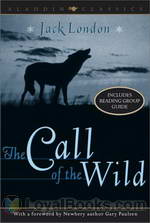 The Call of the Wild
The Call of the Wild
Call of the Wild is an emotional rollercoaster of a novel set during the late 19th century Klondike Gold Rush. The central character is Buck, an Alaskan sled dog who is forced to adjust to the cruel climate in order to survive. If you have even a remote love of dogs then you will fall head over heels in love with this book. In fact, take away the fact that Buck is a dog and the story is the same, a struggle against greed and to live a life of freedom. London spent a year in Yokel researching the book, making it extremely detailed, very simplistic in its descriptions and genuinely heartfelt... | |
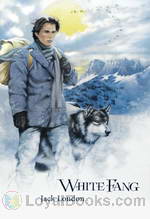 White Fang
White Fang
Hugely popular among younger readers, White Fang by Jack London was a runaway hit when it first debuted in 1906, as a serial story in the Outing magazine. Since then it continues to enjoy immense acclaim and popularity as a coming of age allegory where a nonconformist youngster is transformed into a responsible citizen. The most appealing aspect of White Fang is that it's told from the point of view of an animal, in this case an Alaskan Husky. Like Black Beauty by Anna Sewell, White Fang also addresses ethical issues, social injustices and cruelty to our four footed friends... | |
 The Sea Wolf
The Sea Wolf
A maritime classic acclaimed for its exciting adventure, The Sea Wolf offers a thrilling tale of life at sea, while exploring the many difficulties that may erupt on board a ship captained by a brutally hedonistic and controlling individual. Additionally, the psychological adventure novel covers several themes including mutiny, existentialism, individualism, brutality, and the intrinsic will to survive. The novel sets into motion when its protagonist, the soft and cultivated scholar Humphrey van Weyden, is witness to a precarious collision between his ferry and another ship... | |
 The Faith of Men
The Faith of Men
A collection of short stories by author Jack London | |
 John Barleycorn or Alcoholic Memoirs
John Barleycorn or Alcoholic Memoirs
Jack London died at the age of forty. In this autobiographical work, London describes his life as seen through the eyes of John Barleycorn (alcohol). There is much controversy about the cause of his death just as there is about alcoholism and addiction. London’s brutally frank and honest analysis of his own struggles and bouts with alcohol was way before its time and more modern theories of addiction. With remarkable candor and insight, London describes the demons and gods he encountered through both friend and enemy, John Barleycorn. | |
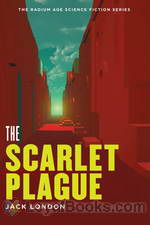 The Scarlet Plague
The Scarlet Plague
Known mainly for his tales of adventure, this work of science fiction by Jack London is set in a post-apocalyptic future. It’s 2072, sixty years after the scarlet plague has depopulated the planet. James Howard Smith is one of the few survivors of the pre-plague era left alive in the San Francisco area, and as he realizes his time grows short, he tries to impart the value of knowledge and wisdom to his grandsons. Through his narrative, we learn how the plague spread throughout the world and of the struggles of the handful of survivors it left in its wake. The Scarlet Plague was originally published in London Magazine in 1912. | |
 The Iron Heel
The Iron Heel
A dystopian novel about the terrible oppressions of an American oligarchy at the beginning of the Twentieth Century, and the struggles of a socialist revolutionary movement. (Introduction by Matt Soar) | |
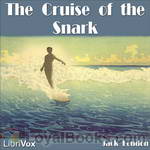 The Cruise of the Snark
The Cruise of the Snark
The Cruise of the Snark (1913) is a memoir of Jack and Charmian London’s 1907-1909 voyage across the Pacific. His descriptions of “surf-riding”, which he dubbed a “royal sport”, helped introduce it to and popularize it with the mainland. London writes: Through the white crest of a breaker suddenly appears a dark figure, erect, a man-fish or a sea-god, on the very forward face of the crest where the top falls over and down, driving in toward shore, buried to his loins in smoking spray, caught up by the sea and flung landward, bodily, a quarter of a mile... | |
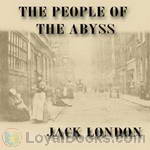 The People of the Abyss
The People of the Abyss
Jack London lived for a time within the grim and grimy world of the East End of London, where half a million people scraped together hardly enough on which to survive. Even if they were able to work, they were paid only enough to allow them a pitiful existence. He grew to know and empathise with these forgotten (or ignored) people as he spoke with them and tasted the workhouse, life on the streets, … and the food, which was cheap, barely nutritious, and foul.He writes about his experiences in... | |
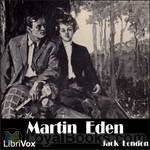 Martin Eden
Martin Eden
Martin Eden (1909) is a novel by American author Jack London, about a struggling young writer. It was first serialized in the Pacific Monthly magazine from September 1908 to September 1909, and subsequently published in book form by The Macmillan Company in September 1909.This book is a favorite among writers, who relate to Martin Eden's speculation that when he mailed off a manuscript, 'there was no human editor at the other end, but a mere cunning arrangement of cogs that changed the manuscript from one envelope to another and stuck on the stamps,' returning it automatically with a rejection slip... | |
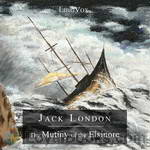 The Mutiny of the Elsinore
The Mutiny of the Elsinore
This is the story of a voyage of a sailing ship from Baltimore to Seattle, east-to-west around Cape Horn in the winter. It is set in 1913 and the glory days of “wooden ships and iron men” are long over. The Elsinore is a four-masted iron sailing vessel carrying a cargo of 5000 tons of coal. She has a “bughouse” crew of misfits and incompetents. This book was published in 1915 and some actions of some of the characters seem odd to us today. There is romance, but it is strangely platonic. Two important characters disappear with no real explanation... | |
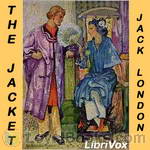 The Jacket (or Star Rover)
The Jacket (or Star Rover)
This book by Jack London was published under the name of "The Jacket" in the UK and "The Star Rover" in the US. A framing story is told in the first person by Darrell Standing, a university professor serving life imprisonment in San Quentin State Prison for murder. Prison officials try to break his spirit by means of a torture device called "the jacket," a canvas jacket which can be tightly laced so as to compress the whole body, inducing angina. Standing discovers how to withstand the torture by entering a kind of trance state, in which he walks among the stars and experiences portions of past lives... | |